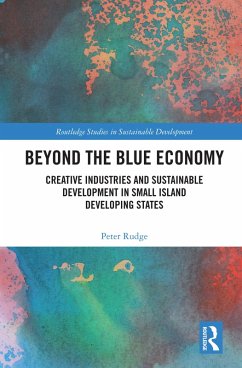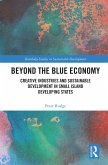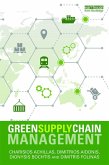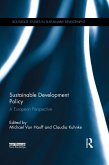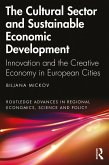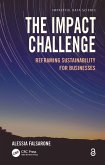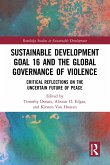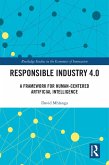This book argues for a broader approach to sustainable growth in Small Island Developing States (SIDS).
This book will be of great interest to scholars and practitioners of economic geography, sustainable development, development studies and the creative industries.
This book will be of great interest to scholars and practitioners of economic geography, sustainable development, development studies and the creative industries.
Dieser Download kann aus rechtlichen Gründen nur mit Rechnungsadresse in A, B, BG, CY, CZ, D, DK, EW, E, FIN, F, GR, HR, H, IRL, I, LT, L, LR, M, NL, PL, P, R, S, SLO, SK ausgeliefert werden.
It is hard to imagine a time when the world is more in need of new ideas. Almost overnight, it seems, long-held certainties have been swept away. Nothing can any longer be taken for granted. All nations are being tested, but probably none more than small island states, invariably surviving on a slender economic base. What will they do if tourism can no longer bring in much-needed income?
Peter Rudge's book could not be more timely. He knows about small island states - but he also understands the potential of the digital-creative industries. How, he asks, can the one help the other? Can we see these activites as a source of new energy and innovation? His answers are perceptive and stimulating. The book is a 'must' for all who are trying to make sense of the future. We should be more optimistic, if only because the seeds of sustainable change have already been planted. Now let us help them to grow.
Emeritus Prof. Dennis Hardy, former Vice Chancellor of the University of the Seychelles
"Peter Rudge addresses a question that small island developing states have been asking themselves (and others) for many years: what can we do to diversify our economy so that the precariousness resulting from over-dependence on tourism (or another single sector) can be removed?
The sheer importance of this question can be fully appreciated with the onslaught of the global COVID-19 pandemic at the beginning of 2020. Those countries that built their economies on tourism, for example, never thought that they would see a day when it would be necessary to close their borders to all incoming tourists. C-19 made it a reality. There was zero income from tourism for at least a quarter and economies collapsed.
Peter's discussion about diversification of SIDS economies into digital creative industries offers policy-makers inspiring ideas that hold real potential for development of alternative development strategies.
For politicians and policy-makers alike, as well as for academics and students of development policy, this book offers ideas that can be developed and embodied into national development strategies and upon which further research could follow."
Professor Fazeel Najeeb, Maldives National University and former Governor of the Central Bank of the Maldives and Maldives Governor to the International Monetary Fund.
Sustainable economic growth for Small Island Developing States (SIDS) provides the focus for this book. SIDS are introduced - islands where reliance on the blue economy has historically been the norm and where livelihoods are provided for through traditional industries like fishing and tourism. These are islands which have low carbon emissions yet which, ironically, are the most likely to suffer from climatic change and external forces that reveal vulnerabilities and result in shock.
The discussion regarding vulnerability and shock revolves around economic and climatic & environmental issues as well as cultural, societal and political changes. The discussion of this highlights the negative impact on SIDS in context of their economies through, for example, a collapse in the tourism industry and other island industries that rely on the blue economy and the consequential effect on food security and infrastructure, employment and income. This draws out the stark reality of macro-level external forces that have direct and indirect impact at meso-level and micro-level SIDS socio-economic systems.
The issue of regional and multi-regional collaboration in response to addressing low resilience, vulnerability and shock is raised, as is the role of cross-sector and multi-sector approaches to blue economy innovation. The emphasis on this is well-placed and sets the scene for the discussion in later chapters that focuses on a number of very relevant contemporary perspectives: creative industries and Sustainable Development Goals (SDGs), SIDS and the fourth industrial revolution (4IR), the concept of clusters as a method for growing industrial sectors, a collaborative model for industry, academia & government, the orchestration of ecosystem development, entrepreneurship in SIDS and the digital-creative future.
The book presents an interesting narrative and discussion that forms a coherent and meaningful link and congruence between Small Island Developing States that have historically relied on natural local resources and ecosystems intrinsic to the blue economy and a forward-looking vision and approach based on collaborative innovation, research and policy to deliver equitable and sustainable economic growth for those islands in the face of the expanding digital, knowledge, service and experience economies. This latter aspect demonstrates the timely publication of this book - a time in which digital transformation is creating a new wave of change, altering human engagement and experience with the environment and creating new ecosystems and business models that are driving international trade and export of digital and physical assets.
The book offers a refreshing and contemporary approach to discussing the evolutionary and revolutionary force of digital innovation and transformation in the creative industries in the context of Small Island Developing States (SIDS). It includes facts and insights into the flow of resources, knowledge & skills capability, a UK-based case study and a discussion on creative industries and digital innovation & technologies in a distinct SIDS socio-economic non-urban context.
The content is well-researched, written in a clear, logical and coherent manner and will enable readers of this book - policy makers, practitioners, scholars and students of the subject area to form a well-grounded and balanced view of the historic SIDS context and future opportunities that go beyond reliance on the blue economy.
Professor Khawar Hameed, Professor of Digital Innovation, Birmingham City University
Peter Rudge's book could not be more timely. He knows about small island states - but he also understands the potential of the digital-creative industries. How, he asks, can the one help the other? Can we see these activites as a source of new energy and innovation? His answers are perceptive and stimulating. The book is a 'must' for all who are trying to make sense of the future. We should be more optimistic, if only because the seeds of sustainable change have already been planted. Now let us help them to grow.
Emeritus Prof. Dennis Hardy, former Vice Chancellor of the University of the Seychelles
"Peter Rudge addresses a question that small island developing states have been asking themselves (and others) for many years: what can we do to diversify our economy so that the precariousness resulting from over-dependence on tourism (or another single sector) can be removed?
The sheer importance of this question can be fully appreciated with the onslaught of the global COVID-19 pandemic at the beginning of 2020. Those countries that built their economies on tourism, for example, never thought that they would see a day when it would be necessary to close their borders to all incoming tourists. C-19 made it a reality. There was zero income from tourism for at least a quarter and economies collapsed.
Peter's discussion about diversification of SIDS economies into digital creative industries offers policy-makers inspiring ideas that hold real potential for development of alternative development strategies.
For politicians and policy-makers alike, as well as for academics and students of development policy, this book offers ideas that can be developed and embodied into national development strategies and upon which further research could follow."
Professor Fazeel Najeeb, Maldives National University and former Governor of the Central Bank of the Maldives and Maldives Governor to the International Monetary Fund.
Sustainable economic growth for Small Island Developing States (SIDS) provides the focus for this book. SIDS are introduced - islands where reliance on the blue economy has historically been the norm and where livelihoods are provided for through traditional industries like fishing and tourism. These are islands which have low carbon emissions yet which, ironically, are the most likely to suffer from climatic change and external forces that reveal vulnerabilities and result in shock.
The discussion regarding vulnerability and shock revolves around economic and climatic & environmental issues as well as cultural, societal and political changes. The discussion of this highlights the negative impact on SIDS in context of their economies through, for example, a collapse in the tourism industry and other island industries that rely on the blue economy and the consequential effect on food security and infrastructure, employment and income. This draws out the stark reality of macro-level external forces that have direct and indirect impact at meso-level and micro-level SIDS socio-economic systems.
The issue of regional and multi-regional collaboration in response to addressing low resilience, vulnerability and shock is raised, as is the role of cross-sector and multi-sector approaches to blue economy innovation. The emphasis on this is well-placed and sets the scene for the discussion in later chapters that focuses on a number of very relevant contemporary perspectives: creative industries and Sustainable Development Goals (SDGs), SIDS and the fourth industrial revolution (4IR), the concept of clusters as a method for growing industrial sectors, a collaborative model for industry, academia & government, the orchestration of ecosystem development, entrepreneurship in SIDS and the digital-creative future.
The book presents an interesting narrative and discussion that forms a coherent and meaningful link and congruence between Small Island Developing States that have historically relied on natural local resources and ecosystems intrinsic to the blue economy and a forward-looking vision and approach based on collaborative innovation, research and policy to deliver equitable and sustainable economic growth for those islands in the face of the expanding digital, knowledge, service and experience economies. This latter aspect demonstrates the timely publication of this book - a time in which digital transformation is creating a new wave of change, altering human engagement and experience with the environment and creating new ecosystems and business models that are driving international trade and export of digital and physical assets.
The book offers a refreshing and contemporary approach to discussing the evolutionary and revolutionary force of digital innovation and transformation in the creative industries in the context of Small Island Developing States (SIDS). It includes facts and insights into the flow of resources, knowledge & skills capability, a UK-based case study and a discussion on creative industries and digital innovation & technologies in a distinct SIDS socio-economic non-urban context.
The content is well-researched, written in a clear, logical and coherent manner and will enable readers of this book - policy makers, practitioners, scholars and students of the subject area to form a well-grounded and balanced view of the historic SIDS context and future opportunities that go beyond reliance on the blue economy.
Professor Khawar Hameed, Professor of Digital Innovation, Birmingham City University

